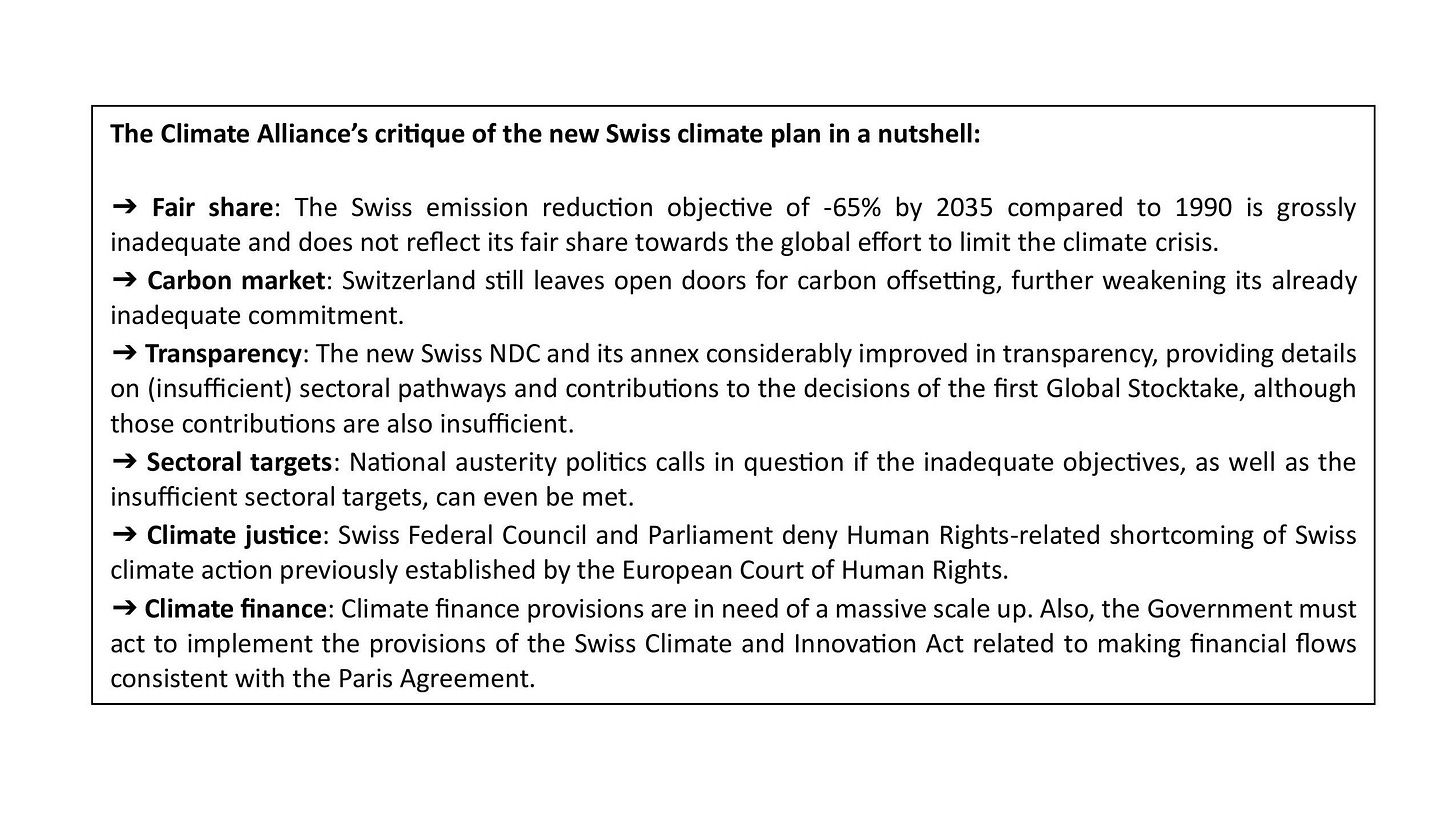Why Switzerland’s new climate plan is grossly inadequate
Guest commentary by the Swiss Climate Alliance on Switzerland’s new climate plan
Nationally Determined Contributions, or NDCs, are national climate action plans by each country under the Paris Agreement, and are submitted every five years to the United Nations. Last week Switzerland’s Federal Council published its new NDC. As the Swiss Climate Alliance elaborates, the Swiss plan is grossly inadequate:
1) Equity and fair share: grossly insufficient
The Swiss objective of reducing emissions by 65% by 2035 compared to 1990, Switzerland is grossly inadequate as it completely ignores principles for sharing efforts among countries: Even the most lenient way of sharing efforts - a simple equal per capita allocation of the remaining carbon budget - cannot be met with Switzerland's approach, let alone more adequate ways of effort sharing considering historic responsibility and economic capacities. With the proposed NDC, the remaining carbon budget for Switzerland resulting from an equal per capita approach for a 50% chance to stay within the 1.5°C-limit will be used entirely by 2032 at the latest. If both historic emissions since 1990 and economic capacities are taken into account, Switzerland used its proportion of the global carbon budget already by 1999.
The Swiss NDC also fails to live up to its own definition of fair share, which includes consumption-based emissions as an equity-defining factor. Completely ignoring historic responsibility and economic capacities, Switzerland does not honor its commitments under the Paris Agreement.
2) Responding to the first Global Stocktake
● Emission reduction target: open door for carbon offsetting
The Swiss emission reduction target is further weakened by the continued reliance on emissions reductions from abroad. Switzerland misses the chance to end its reliance on carbon credits. Article 6 of the Paris Agreement clearly states that its market mechanism should only be used to increase global ambitions, not to replace national climate efforts of the richest countries. This is particularly important in view of the frequently voiced criticism of the quality of these certificates. It is therefore disappointing that Switzerland leaves the door open to continue buying certificates from abroad until 2035.
● Sectoral targets: the Swiss government undermines its own sectoral plans
It is commendable that Switzerland indicates sector specific emission reduction pathways. However, they do not add up to the announced 2035 overall target and are therefore insufficient. In the annex, Switzerland describes its contribution to the energy transition, to halting and reversing deforestation and to transitioning to sustainable lifestyles. However, the Swiss NDC fails to set a clear timeframe for the phase-out of fossil fuels agreed in Dubai in 2023 and it does not openly state that it will proportionally contribute to tripling renewables and doubling efficiency. What is even more problematic, while the annex lists key policies designed to implement the Swiss NDC, the Federal Council in reality is weakening these policies. For example, the same day the Federal Council approved the Swiss NDC, it also proposed an austerity package that includes the defunding of the successful federal buildings programme designed to improve energy efficiency of buildings. In short, policy measures underpinning the Swiss climate efforts are constantly under pressure, reducing the likelihood that Switzerland can achieve the little effort it committed to.
● Transparency: improved details and information
Switzerland not only published its NDC, but also an annex that details its commitment to mitigation-related commitments from the first Global Stocktake. In addition, Switzerland submitted an update to its long-term climate strategy. What is more, the Swiss NDC clearly lays out the key legal framework for implementing its NDC. This transparency promotes trust in global efforts to combat the climate crisis, even if the Swiss documents don’t detail adaptation, loss & damage and just transition related efforts.
3) Climate Justice and Solidarity: Denial of shortcomings
The Swiss NDC is clear that the country needs to adapt to climate change and that climate change negatively affects health. However, it does not provide any details and also remains silent on how to ensure that climate measures do not exacerbate existing inequalities within and outside of the country. Further, it has to be noted that while Switzerland lays out that it subscribes to rights-based approaches in the NDC, the Federal Parliament and Federal Council in 2024 decided to largely ignore a sentence by the European Court of Human Rights (ECHR) that stated that Switzerland, from a Human Rights perspective, is not doing enough to fight climate change, infringing on the human rights of its citizens.
4) Adequate Finance to respond to needs: Need for massive scale up
The Swiss NDC informs about its ongoing financial contribution and highlights the commitment to contribute a fair share to the new climate finance goal (so-called NCQG) decided at COP29. After having contributed insufficiently to the current climate financing target, it is essential that Switzerland develops a plan on how to massively scale up its contribution. The Swiss fair share to climate finance should be based on real climate finance needs and not on the insufficient climate finance quantum and quality decided at COP29. Switzerland also needs to contribute to cover loss and damage. Thus, the Swiss contribution needs to scale up to reach 10 billion USD per year. The NDC mentions the plans to reform the Swiss financial centre in order to align financial flows with climate objectives. However, at the same time, the Federal Council is delaying the meaningful implementation of the corresponding article in the Swiss Climate and Innovation Act.
Photo credit: Swiss Climate Alliance





